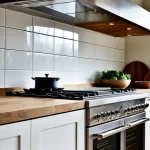Core Artisanal Kitchen Tools for UK Kitchens
Discovering the essential UK kitchen tools is pivotal for anyone passionate about artisanal cooking. These tools are more than simple utensils; they embody precision and craftsmanship that elevate everyday culinary tasks. Among these are specialized knives, wooden spoons crafted from local hardwoods, and fine mesh sieves designed to perfect textures and blends. Each piece plays a vital role in transforming raw ingredients into exquisite dishes.
Traditional British culinary heritage is deeply woven into these must-have tools for cooking, offering timeless functionality that continues to serve modern kitchens well. For example, hand-forged paring knives and classic whisk designs remain staples. They provide a tactile connection to the cooking process that enhances the meticulous nature of artisanal preparation.
Also read : How do UK kitchen products assist in quick meal preparation?
Simultaneously, artisanal kitchen equipment incorporates modern innovations that boost efficiency and accuracy. Tools like digital thermometers ensure precise temperature control, essential for delicate recipes that demand exact heat. Equally, precision scales help measure ingredients to the gram, a practice fundamental in artisan baking and confectionery.
In combining tradition with innovation, these tools foster a balanced culinary environment. Whether preparing hearty British staples or contemporary fusion dishes, the right equipment underpins successful outcomes. Embracing this toolkit supports both the artistry and technical demands of cooking in UK homes today.
Topic to read : What Features Make Kitchen Products Essential for UK Homes?
Traditional Tools Frequently Used in Artisanal UK Cooking
Traditional British kitchen tools such as the mortar and pestle, mechanical scales, and pudding basins have longstanding roles in artisanal cooking. These classic UK utensils enable precise manual processes, from grinding spices finely to measuring ingredients accurately—both vital for authentic recipes. For instance, the mortar and pestle crushes herbs and seeds effectively, releasing natural oils and intensifying flavours, an advantage that modern electric grinders sometimes lack.
Heritage tools remain popular because they offer tactile control and reliability, qualities prized in traditional British kitchen tools. Their enduring presence reflects a commitment to time-tested culinary methods and an appreciation for craftsmanship. Many artisans believe that handling these vintage cooking instruments creates a deeper connection with the cooking process, resulting in superior outcomes.
Reputable UK brands like Mason Cash and Salter continue to manufacture durable traditional equipment, ensuring these tools meet modern standards while preserving authenticity. Mason Cash’s mixing bowls and Salter’s scales, for example, are renowned for combining durability with classic design, making them sought-after in artisanal kitchens across the UK. Choosing such trusted brands provides confidence in functionality, longevity, and culinary heritage.
Modern Essentials for Artisanal Dishes
Artisanal cooking in the UK increasingly benefits from modern artisanal tools that enhance both efficiency and precision. Among these, digital thermometers stand out as essential UK kitchen tools, enabling exact temperature readings critical for perfecting recipes like slow-roasted meats or delicate custards. Their reliability ensures that cooks can confidently execute complex techniques, reducing the risk of undercooking or burning.
High-quality blenders and food processors also rank among must-have tools for cooking, providing versatile functions such as pureeing, emulsifying, and chopping with consistent results. These contemporary kitchen gadgets UK streamline preparation times without sacrificing the artisanal touch that defines handcrafted dishes.
Specialist baking tools, including bench scrapers and microplane graters, support detailed patisserie work where precision matters deeply. Bench scrapers assist in dough portioning and shaping, while microplane graters deliver fine zest or spice grating, enhancing flavor complexity. This level of control is crucial for the exacting standards of artisanal baking.
Emerging UK kitchen innovations have brought forward new brands dedicated to crafting tools that merge tradition with cutting-edge technology. These suppliers focus on ergonomics and material quality, ensuring that the tools not only perform well but also endure frequent use in busy kitchens. Finding these innovative artisanal kitchen equipment options often involves exploring niche retailers or specialized online platforms focused on UK market trends.
Overall, integrating these modern essentials alongside traditional implements creates a balanced, adaptable toolkit for contemporary UK kitchens aiming for artisanal excellence.
Practical Guidance for Using Artisanal Tools Effectively
Ensuring optimal performance and longevity of artisanal kitchen equipment hinges on proper care and usage—vital for maintaining the precision expected from essential UK kitchen tools. Selecting the right tool for each artisanal process prevents unnecessary wear and preserves functionality. For example, using a wooden spoon specifically for stirring delicate sauces rather than heavy stirring tasks reduces the risk of damage and prolongs usability.
Maintenance routines such as regular cleaning, drying, and occasional oiling—particularly for wooden utensils—are paramount to inhibit cracking or warping. Metal tools like knives and graters require careful sharpening and storage to maintain sharpness and avoid corrosion. Employing protective sheaths or containers shields these must-have tools for cooking when not in use.
Proper storage also plays a significant role. Allocating dedicated spaces where tools remain organized and accessible minimizes the chances of mechanical damage and streamlines workflow during preparation. For instance, magnetic strips for knives or designated drawers for baking implements help keep tools in prime condition.
Additionally, understanding each tool’s specific function maximizes its effectiveness. Knowing when to reach for a microplane grater versus a bench scraper enhances precision and efficiency in baking tasks, ensuring the artisanal quality of the final dish. Following best practices in artisanal cooking ensures tools perform consistently, supporting the craftsmanship crucial in UK kitchens committed to artisanal excellence.
Top Recommendations for Purchasing Artisanal Kitchen Tools in the UK
When seeking essential UK kitchen tools, prioritising quality, durability, and authenticity ensures your investment supports artisanal cooking traditions effectively. The best UK kitchen tool brands have earned reputations by combining craftsmanship with reliable performance, making them trusted choices for serious cooks. These brands often offer a balance of traditional design and modern functionality, reflecting both heritage and innovation in their product lines.
For prospective buyers wondering where to buy kitchen tools UK, a diverse range of options exists. Specialist kitchenware stores, both physical and online, cater specifically to artisanal needs. Brick-and-mortar retailers allow hands-on inspection of materials and ergonomics, which can be crucial for tools like knives and wooden spoons. Online platforms provide access to niche brands and comprehensive reviews, facilitating informed choices across extensive inventories.
Key factors in a buying guide for artisanal tools include:
- Material quality: Opt for hardwoods, high-grade stainless steel, or food-safe composites to ensure longevity and food safety.
- Brand reputation: Selecting established UK brands known for their craftsmanship reduces the risk of inferior products.
- Tool specificity: Choose implements designed for particular culinary techniques to enhance precision and ease of use.
- Warranty and aftercare: Reliable brands often offer guarantees and support, reflecting confidence in their artisanal kitchen equipment.
Exploring these criteria alongside user reviews and product descriptions can meaningfully guide acquisition decisions. This approach helps chefs and enthusiasts alike build a versatile and dependable collection of must-have tools for cooking that withstand the demands of artisanal food preparation in UK kitchens.


